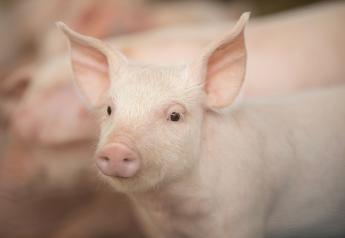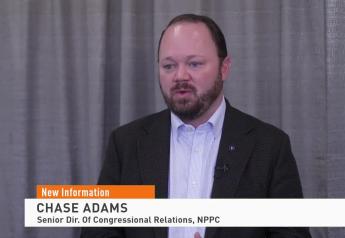Proposition 12 Reaches Beyond Livestock Industry Into Your Pocketbook

California consumers will likely experience an unnecessary increase in food prices and a decrease in consumer options now that Proposition 12, a ballot measure that requires more housing space for certain hens, breeding pigs and calves raised for veal, has passed in their state, says Jim Monroe, senior director of public relations with the National Pork Producers Council.
Out-of-state producers will also need to meet the new “cage-free” production standards to sell their goods in the Golden State, which has a population of 39.5 million people. These state mandates – without any scientific justification or benefit to the states or its citizens – are dictating how producers in other states raise their animals.
NPPC maintains that it is unconstitutional for states to regulate outside of their borders.
“We continue to support federal legislative and judicial solutions that would overturn state laws like this, including the Protect Interstate Commerce Act and a suit brought by attorneys general from 11 states against California and Massachusetts for advancing ballot initiatives that violate the Constitution’s commerce clause,” Monroe says.
Proposition 12 garnered more than 4 million votes on Tuesday and passed with 61% of the vote, reports Jim Wiesemeyer of ProFarmer.
By 2022, hens raised in California must be raised "cage-free," though that definition could include indoor areas that provide between 1-square-foot and 1.5-square-feet of space per hen. Violations will result in a misdemeanor charge and a $1,000 fine.
The measure also sets square-footage requirements for breeding pigs and calves raised for veal. Under Proposition 12, calves confined for production must have at least 43-square-feet (4-square-meters) of usable floor space, while breeding pigs must be given at least 24-square-feet (2.2-square-meters) of floor space in their pens, starting in 2022.
California is growing increasingly aggressive in banning the sale of out-of-state goods made from production practices that don’t meet its criteria, says Erica Sanko, executive director of the California Pork Producers Association.
“Pork producers must be allowed to use housing systems and other production methods that work best for their operations and their animals, and producers in one state should not be told how to raise and care for their animals by the lawmakers, regulators or citizens in another state – especially when they have little or no knowledge of the industry,” Sanko says.
Minimizing aggression, protecting sows from environmental extremes, and reducing exposure to hazards are just a few reasons why the American Veterinary Medical Association (AVMA) supports gestation stalls as a safe housing practice.
“Producers make housing decisions thoughtfully based on pig behavior, genetics, daily health care needs and life stage,” Sanko says. “It is crucial that producers maintain the ability to choose housing systems that work best for their pigs and farms.”
Wiesemeyer says the House farm bill, which is in conference with the Senate, includes an amendment from Rep. Steve King (R-Iowa) that would require states to permit the sale of any agricultural product that is not prohibited under federal law.
“A decision on the Supreme Court taking up this case is pending,” Monroe says. “Not only do these state regulations violate the Constitution, but they are also bad for consumers...especially low-income families.”







